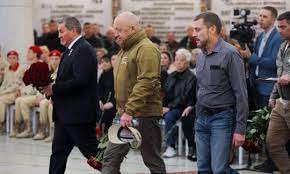Samantha de Bendern
The rise of Yevgeny Prigozhin, a Russian oligarch, Putin confidant and head of the notorious Wagner private military company, is a sign of the erosion of the rule of law in Russia. It shows that the state is willing to tolerate extreme, unaccountable violence as long as it serves its interests. This could ultimately become a threat to the regime itself.
Prigozhin is a private citizen who was previously a restaurant magnate – known as “Putin’s chef” due to the president’s patronage of his restaurants and catering firms. But at some point in 2014, he co-founded the Wagner Group along with former Russian military personnel, and has since become a major player in Russia’s military campaign in Ukraine.
In the last few months he has taken on prerogatives normally reserved for senior government officials or the president himself. And yet he has no official legal function either in the government or the military – and the Wagner company itself is technically illegal as private military companies are outlawed in Russia.
When Prigozhin began recruiting for soldiers in Russian prisons in the late summer of 2022, offering them a pardon in exchange for six months’ service in Ukraine, Russian lawmakers were unable to explain on what legal basis he was operating. Under Russian law, only the president can pardon convicted felons, and freeing them before the end of their term requires a drawn-out legal process. However, in late January, after the first batch of Wagner convict soldiers were sent back into society as free men, Kremlin spokesman Dmitry Peskov stated that the pardons were completely legal, but that some decrees were kept secret.
Many assume that the Kremlin allows Prigozhin to operate in a legal shadowland so that it can wash its hands of Wagner’s actions should they become too extreme. An unofficial army offers the regular army an opportunity to deny responsibility for excessive losses in men or territory, or in an instance where it faces allegations of war crimes in the field. This implies a parallel army, ready to accept its role as a subordinate or scapegoat.
Prigozhin, however, has shown signs that he won’t accept a purely subordinate role. He openly criticises and challenges state officials, including top generals. And the ministry of defence and Wagner have openly contradicted each other in claiming responsibility for recent Russian gains in Donbas. Prigozhin recently announced he was no longer recruiting in prisons. Although he claims that this is because he now has enough men, it could be a sign that the defence ministry is trying to clip his wings.
Prigozhin recently asked the Russian parliament to introduce changes to the law to make criticism of his convict soldiers illegal. The Duma speaker responded by asking the parliamentary security and defence committee to study the question. If the requested changes are made, this could seriously complicate the prosecution of former convict soldiers for any new crimes. By giving such a free rein to Prigozhin, the Kremlin is creating a state-sanctioned culture of criminal violence.
Even before last year’s invasion of Ukraine, Wagner had a reputation for summary murders, rape and extreme violence. A dire recent example of this was the filmed sledgehammer killing of a Wagner deserter from Ukraine, who had been returned to Russia in a prisoner exchange. Prigozhin praised the killing and Peskov stated that the murder was not government business. When the state openly accepts that it no longer holds the monopoly of the use of force, it is sending one of two messages: state and criminal violence have blurred into one, or else it is no longer in control.
Other private armies are also on the rise. Defence minister Sergei Shoigu’s private army, Patriot, has been operating in Ukraine since 2014, and oligarch Gennady Timchenko’s private army, Redut, originally created to protect his company’s gas field, is also present in Ukraine. Not to mention the Chechen leader Ramzan Kadyrov’s army. On 7 February the gas giant Gazprom announced it was creating its own private military company.
Wagner is the most prominent, with an estimated 50,000 members operating in Ukraine alone, and the only one led by an operator who is behaving more and more like someone seeking real political influence; Prigozhin, indeed, is sometimes touted as a successor to Putin. In one of his latest video appearances, he addresses the Ukrainian president, Volodymyr Zelenskiy, from the cockpit of an Su-24 fighter-bomber, challenging him to a duel in the skies in exchange for territory in Ukraine. This suggests that Prigozhin not only considers himself a peer of Zelenskiy, but has scant regard for diplomatic protocol in international relations, under which only another head of state should address his or her counterpart directly.
I have spoken, off the record, to a former KGB officer and a Russian oligarch, who both maintain that Prigozhin is intentionally hyped up as a bogeyman, to be presented to Russian audiences who fantasise about regime change. The warning is clear: if Putin goes, things could be worse. Whether or not Prigozhin is a puppet whose strings can be cut at Putin’s will is ultimately irrelevant. Criminal violence is now tolerated and is becoming institutionalised in Russia. For now, Putin still seems to be in control. But by delegating the use of force to non-state actors, he is giving them a taste of power that could become unmanageable the day the regime shows signs of weakness. The world needs to be prepared for the chaos that will ensue.
The Guardian







